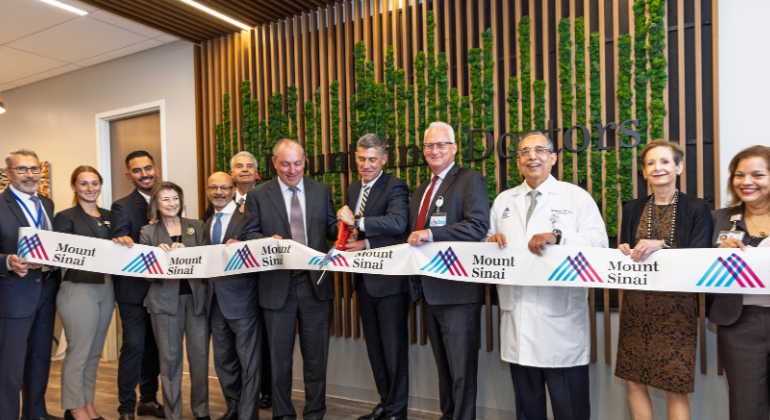Mount Sinai Expert Warns Chronic Headaches Could Stem from Neck and Spine Issues
Samuel K. Cho, MD, Assistant Professor of Spinal Surgery provides differences between average headaches and cervicogenic headaches.
Samuel K. Cho, MD, Assistant Professor of Spinal Surgery at Mount Sinai's Department of Orthopaedics, is an expert on cervicogenic headaches, which usually stem from issues within the spine and can require more treatment than the average headache. With over 45 million Americans suffering from chronic headaches, it's important to recognize the symptoms that are associated with severe headaches that may require special medical attention.
"Few people recognize the severity of cervicogenic headaches which usually start in the neck or back of the head and can spread to other areas of the head, including around the eyes or behind the ears," says Dr. Cho. "Typically, we recommend non-operative treatments like physical therapy and medications. However, when severe pain continues, spine surgery can effectively treat cervicogenic headaches and alleviate further pain."
Symptoms of cervicogenic headaches include:
- Steady, non-throbbing pain at the back and base of the skull
- Continuous pain in the neck and shoulder blades
- Pain that radiates to around the eyes or behind the ears
- Experience of headache with certain neck motion
- Pain, numbness or tingling going down the arms
Dr. Cho is a nationally recognized leader in spinal surgery and has advanced expertise in a wide range of spinal procedures from microscope-assisted artificial disc replacement to the most complex spinal reconstruction for scoliosis. Dr. Cho's clinical interests include degenerative disorders of the cervical, thoracic, and lumbar spine (herniated disc, spinal stenosis, etc.); spinal deformities (scoliosis, kyphosis, flatback syndrome, etc.), spinal tumors, metastatic spine disease, spine trauma, minimally invasive spine surgery, and motion-sparing technology (artificial disc replacement). His research includes disc biology, clinical outcomes following spinal surgery, as well as the epidemiology of spinal disorders.
About The Mount Sinai Medical Center
The Mount Sinai Medical Center encompasses both The Mount Sinai Hospital and Mount Sinai School of Medicine. Established in 1968, Mount Sinai School of Medicine is one of the leading medical schools in the United States. The Medical School is noted for innovation in education, biomedical research, clinical care delivery, and local and global community service. It has more than 3,400 faculty in 32 departments and 14 research institutes, and ranks among the top 20 medical schools both in National Institutes of Health (NIH) funding and by U.S. News and World Report.
The Mount Sinai Hospital, founded in 1852, is a 1,171-bed tertiary- and quaternary-care teaching facility and one of the nation's oldest, largest and most-respected voluntary hospitals. In 2012, U.S. News and World Report ranked The Mount Sinai Hospital 14th on its elite Honor Roll of the nation's top hospitals based on reputation, safety, and other patient-care factors. Mount Sinai is one of 12 integrated academic medical centers whose medical school ranks among the top 20 in NIH funding and by U.S. News and World Report and whose hospital is on the U.S. News and World Report Honor Roll. Nearly 60,000 people were treated at Mount Sinai as inpatients last year, and approximately 560,000 outpatient visits took place.
For more information, visit http://www.mountsinai.org.
Find Mount Sinai on:
Facebook: http://www.facebook.com/mountsinainyc
Twitter @mountsinainyc
YouTube: http://www.youtube.com/mountsinainy
# # #
About the Mount Sinai Health System
Mount Sinai Health System is one of the largest academic medical systems in the New York metro area, with 48,000 employees working across seven hospitals, more than 400 outpatient practices, more than 600 research and clinical labs, a school of nursing, and a leading school of medicine and graduate education. Mount Sinai advances health for all people, everywhere, by taking on the most complex health care challenges of our time—discovering and applying new scientific learning and knowledge; developing safer, more effective treatments; educating the next generation of medical leaders and innovators; and supporting local communities by delivering high-quality care to all who need it.
Through the integration of its hospitals, labs, and schools, Mount Sinai offers comprehensive health care solutions from birth through geriatrics, leveraging innovative approaches such as artificial intelligence and informatics while keeping patients’ medical and emotional needs at the center of all treatment. The Health System includes approximately 9,000 primary and specialty care physicians and 11 free-standing joint-venture centers throughout the five boroughs of New York City, Westchester, Long Island, and Florida. Hospitals within the System are consistently ranked by Newsweek’s® “The World’s Best Smart Hospitals, Best in State Hospitals, World Best Hospitals and Best Specialty Hospitals” and by U.S. News & World Report's® “Best Hospitals” and “Best Children’s Hospitals.” The Mount Sinai Hospital is on the U.S. News & World Report® “Best Hospitals” Honor Roll for 2024-2025.
For more information, visit https://www.mountsinai.org or find Mount Sinai on Facebook, Instagram, LinkedIn, X, and YouTube.

Mount Sinai Health System Expands Care in Staten Island
Nov 04, 2024 View All Press Releases
Mount Sinai Health System and USTA Expand Exclusive Partnership Through 2026
Aug 15, 2023 View All Press Releases
Mount Sinai Celebrates 10 Years as the Official Hospital of the US Open
Aug 29, 2022 View All Press Releases

